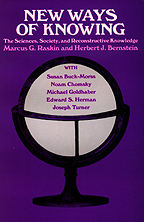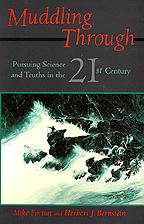ISIS institute Home
Institute News
ISIS institute History
The Institute's Mission
Staff and Board
ISIS Institute Publications
Links
Contact us
Search
Projects Overview
MilWaste Program
Amazon Project
Quantum Physics
Seminars
Science Dialogue
c"recode/index.html">Recoding Life
Institute Fellows
|
BOOKS

New Ways of Knowing: The Sciences, Society, and Reconstructive Knowledge
Marcus G. Raskin, Institute for Policy Studies, and Herbert J. Bernstein, Hampshire College (contributions also from Susan Buck-Morss, Noam Chomsky, Michael Goldhaber, Edward Herman
and Joseph Turner)
Although the need to limit and control our runaway technologies is widely recognized, the current debate on this subject is primarily concerned with technical questions that largely
overlook the social and ethical issues at the heart of the knowledge process. Noted physicists and social scientists challenge the paradigm of scientific thinking whose applications can
prove destructive to existing social systems. They shift the debate to the need for a radical change of direction that would replace traditional "value-free" inquiry and research with a
knowledge model that incorporates social responsibility, democratic principles and comprehensive ethical standards. Rowman & Littlefield, 1987. Uncorrected text available online
here Autographed new corrected edition, available by ordering from The Institute
published 2012 by CBLS, Marietta OH $30

Muddling Through: Pursuing Science & Truths in the Twenty-First Century
Michael Fortun, RPI & ISIS Institute, and Herbert J. Bernstein, Hampshire College & ISIS Institute
For most people, understanding the sciences means familiarity with the end products of science - a new drug, a new theory of the cosmos, yet another technological advance. But the fascination with and emphasis on these end products obscures the processes that underlie every stage of scientific inquiry from the earliest posing of a question, to the application of scientific truths, to many of our most urgent and complex social problems. In their provocative, now classic, book Mike Fortun and Herbert J. Bernstein advocate a new approach to the sciences of the twenty-first century based on the processes scientists and the sciences actually follow: "muddling through," the combined operations of language, experiment and human social judgments. The authors draw on historical events, the writings of scientists and cutting-edge science to convey the complex interactions that determined how and why ideas, experiments and expert interpretations are shaped into truths that are at once messy and reliable, ambiguous and robust, incomplete and illuminating. Click here to read the book's excellent review in Physics World, the European equivalent of Physics Today, March 2000, page 47. (Reproduced here below the line for those who do not have an IOP account.)
Counterpoint Press, 1998. Autographed hardcover. $16 (special for 2016 only) To order simply eMail our publications staff with a book order request.
Science: a messy and clumsy business
Muddling Through: Pursuing Science and Truths in the 21st Century
Mike Fortun and Herbert J Bernstein
1998 Counterpoint 331pp £18.95/$27.50 hardbound
Mike Fortun and Herbert Bernstein's book is a masterpiece - a particularly intelligent, useful and unusual book. It will constitute, I strongly believe, a solid mooring point to help us face the challenges and questions - scientific, philosophical and political - that the new century is forcing on us. The book is also refined and subtle enough to help us to avoid (and hopefully to forget) the crude, sterile and empty confrontation, known as the "science wars", that have raged over the last few years. This book must be read, reread and reflected on by everybody - for by arguing that science is a complex and messy business, the authors could have a major effect on how we think about science, about science as knowledge, and about science and politics.
Muddling Through is divided into two main parts. The first deals with the question that has so agitated and divided academia recently - namely, what is science and how does it work? The second part describes the authors' own experiences of various social debates about science.
In academic terms - I mean for scientists and also for historians and philosophers - this is a good and reliable book. Mike Fortun is a historian who is pretty familiar with today's science, while Herbert Bernstein is a quantum physicist who has taken seriously the task of studying what has been published by historians, philosophers and sociologists about scientific knowledge and its place in contemporary society.
However, the book is important not only because it is so deeply informed and of the highest quality, but also because it is so decisive in political and social matters. More to the point: it is decisive because it is both a "theoretical" book - dealing with ideas and words - and a book that relies on field work, particularly on militant action through the Institute for Science and Interdisciplinary Studies. The institute, which is led by the two authors, tries to act as a mediator when conflicts or tensions arise in society around science and technology.
Fortun and Bernstein view their ideas, concepts and ways of describing science not as mere words to throw back and forth in debate, but as tools to help them (and society) cope pragmatically with technology, and vice versa. They view their intellectual work as part and parcel of a larger enterprise of helping scientists to interact with society, and so try hard to be precise and to pay attention to everybody's wordings, claims and motivations. Every word and nuance matters tremendously.
In the first part of the book, the authors illustrate through different approaches - and without believing that there can be a unique, definitive and authoritarian answer - what it means when scientists practise "rationality", and what "experimenting" and "articulating" a proof imply. Using a series of metaphors to help the reader appreciate the many different aspects of experimentation, they suggest methods and tools that we can use to keep complexity at the forefront of scientific inquiry. For example, when considering the work done by Galileo, Darwin or the agricultural geneticists, they suggest graphical ways of representing the intricacies of theoretical and social practices. They suggest how one should judge results, and how to read and make sense of someone else's scientific claims. And they highlight the social connections and the cultural patterns that contribute to the making of science.
In the second, more novel, part of the book, the authors describe the role they have played in various scientific controversies, such as the decontamination of toxic wastes at military bases and current research into "quantum teleportation". Their aim is to help people talk to each other in situations where dialogue has previously seemed impossible. They also try to find common languages, presenting themselves as "translators" who allow scientists, business leaders, military engineers, politicians and laypeople to break out of deadlock.
Experts themselves, they try to share their knowledge and to have it reappropriated by as many people as possible. They refuse to simply assert truths dogmatically: rather, they try to "muddle through" with others, mobilizing all kinds of possible scientific knowledge, rationality and goodwill to support their arguments. Looking for what they call the "excluded middle" - for example by refusing to stick to the entrenched positions in the "science wars" - they value pluralism and responsibility, cultivating a demand for precision but also seeking unusual and new "assemblages" (of theoretical and practical positions, and of people and institutions).
Over and over again they emphasize the importance of science - but with two caveats. The first is to be "a responsible hole-ist" - in other words, to not always insist on being a reductionist. The second is: "Keep it complicated, stupid!" This comment refers to what historians often say about history and social sciences: namely, why should we make things simple (or even simplistic) when they are in fact complicated? Which, in the end, makes a lot of a difference.
About the author
Dominique Pestre was trained as a physicist and a historian. He is currently director of studies at the École des Hautes Études en Sciences Sociales, Paris.
NEWSLETTERS
Current and past issues of our newsletter, After the Fact, are available for download. So is the first issue (Summer 2000) of the new ISISinstitute journal. They can be viewed and printed using Acrobat Reader. Printed copies are also available from the Institute office.
Occasional Papers and Offprints
Institute occasional papers are the work of individual authors and represent their own efforts. Opinions, analysis, interpretations, conclusions, and recommendations are those of the authors and not those of the ISIS Institute, its officers, staff, Fellows, or members.
Amherst College Geology, "Terrain Conductivity Investigation of Landfill B Leachate Plume, Westover Air Reserve Base, Massachusetts."
Frederique Apffel-Marglin, "Smallpox in Two Systems of Knowledge."
Herbert J. Bernstein, "Idols of Modern Science and the Reconstruction of Knowledge."
Michael Fortun, "Time, Busy Bodies, and the Habit of Becoming-Genetic."
Michael Fortun and S.S. Schweber, "Scientists and the Legacy of World War II: The Case of Operations Research."
Michelle M. Murrain, "Differences in Opportunistic Infection Rates in Women with AIDS."
Marcus G. Raskin, "Reconstruction and Its Knowledge Method."
Marcus G. Raskin and Herbert J. Bernstein, "Toward a Reconstructive Political Science."
Tom Roeper, "The Responsibility of Linguists."
(The occasional papers are available for $4.50 each to cover reproduction and mailing costs.)
Audio Tape Recordings: Seminar Transcript Series
Please call for information.
A somewhat outdated draft of our complete publications catalog is available for download. It includes the two books described above, seminars recordings, and occasional papers. For more information or to order, please contact us at the places/methods listed below.
An addition to the catalog: Randel Hanson's paper "10,000 Years of the American Century: Reflections on Official U.S. Governmental Acknowledgements Regarding Nuclear Waste," presented at the
Summer 2001 Federal Facilities Cleanup Workshop. Download it here or contact The Institute to order a printed copy.
Publications may be ordered directly from the Institute for Science:
Institute for Science & Interdisciplinary Studies
Hampshire College/NS
893 West Street
Amherst, MA 01002-5001
Tel. (413) 559-5582
Fax. (413) 559-5448
isisgu@hampshire.edu
|


